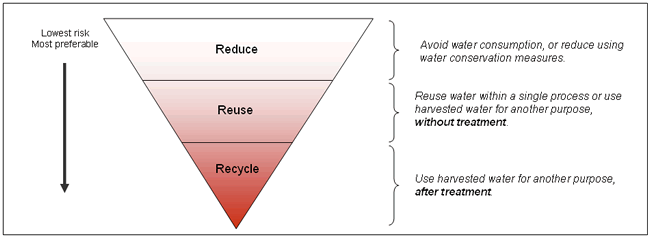Our waterways and water resources need protecting and all Victorians, from individuals to businesses and organisations, have a vital role to play. This can range from reducing our water use and recycling water to preventing litter or pollution from degrading our waterways, groundwater and the marine environment.
There are many ways we can reduce our impact on the water environment. Here are some ways to take action by:
Also see our eight tips for cleaner waterways below.
Conserving water
Factors such as climate change, population growth and extended drought are placing increasing pressure on our finite water resources. This has increased community interest and the importance of water conservation.
The best way to conserve water is by reducing water use and avoiding producing wastewater. This can be illustrated through a water conservation hierarchy.
The water conservation heirarchy

At the household level, there are many ways to conserve water, such as taking shorter showers and installing water-efficient appliances like dual-flush toilets, front-loading washing machines and low-flow showerheads. Another approach is to plant water-efficient gardens with native species or rain gardens that don’t require as much water.
Refer to www.ourwater.vic.gov.au (DSE) for more water-saving measures and programs, both for households and for business and industry.
Reusing and recycling water
Reusing or recycling water and using alternative water supplies are key to reducing the pressure on our water resources. It is important to choose the most appropriate alternative water source in terms of the risk, resource and energy requirements. You should also consider when and how much water is needed and available.
Further information is available on reusing and recycling water and alternative water supplies including rainwater, stormwater, greywater, sewage, industrial water and managed aquifer recharge.
Preventing pollution
EPA prevents pollution through a range of activities, including most directly through works approvals and licenses for high risk activities. However, you too can play an important role in preventing pollution in the following ways:
- If you observe someone dumping anything down a stormwater drain you can call EPA or report it through our website. You should record as many details of the incident as possible.
- Litter dropped in the street will be swept into street drains next time it rains, ending up in our creeks, rivers, beaches and bays. Report litterers to EPA's 24 hour toll-free litter report line.
Information on stormwater pollution and what we can do about it is on our stormwater pages.
You can also browse more information on the threats to Victoria's water environment pages.
Eight tips for cleaner waterways
- Put cigarette butts in the bin, don't drop them on the street. Butts dropped in our streets get washed into stormwater drains and end up in our creeks and on our beaches. They account for about half of all litter found on our beaches.
- Put litter in a bin or take it home. All litter dropped on the street follows the same path - through the stormwater system to our beaches and creeks.
- Compost or mulch leaves and grass clippings, don't leave them in the gutter. Garden refuse washed into stormwater drains end up polluting our creeks and beaches. Clear your paths, driveways and gutters with a broom rather than a hose.
- Don't allow paint, turps or chemical cleaners to enter drains. Dispose of unwanted chemicals, solvents and oils responsibly. Use regular chemical collections in your area to dispose of chemicals.
- Wash your car on grass (if water restrictions allow) or at the car wash. Don't allow detergents to enter the gutter. If you use a commercial car wash, use one that recycles the wash water.
- Have building supplies delivered to your site. If left on the footpath, pollutants will be swept into stormwater drains from the road or nature strip by the wind and rain.
- When cutting bricks and pavers, do it over grassed areas or a container that collects the waste.
- Take action! If you see someone throwing litter from a car or other vehicle, don't put up with it, report them to EPA.